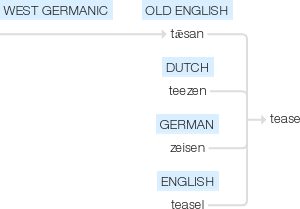Tease
Old English tǣsan (in tease (sense 2 of the verb)), of West Germanic origin; related to Dutch teezen and German dialect zeisen, also to teasel. Sense 1 is a development of the earlier and more serious ‘irritate by annoying actions’ (early 17th century), a figurative use of the word's original sense.
wiktionary
From Middle English tesen, from Old English tǣsan(“to tease”), from Proto-West Germanic *taisijan(“to separate, tug, shred”).
etymonline
tease (v.)
formerly also teaze, Old English tæsan "pluck, pull, tear; pull apart, comb" (fibers of wool, flax, etc.), from Proto-Germanic *taisijan (source also of Danish tæse, Middle Dutch tesen, Dutch tezen "to draw, pull, scratch," Old High German zeisan "to tease, pick wool").
The original sense is of running thorns through wool or flax to separate, shred, or card the fibers. The figurative sense of "vex, worry, annoy" (sometimes done in good humor) emerged 1610s. For similar sense development, compare heckle. Hairdressing sense is recorded from 1957. Related: Teased; teasing; teasingly.
tease (n.)
1690s, "act of teasing," from tease (v.). Meaning "one who teases" is from 1852. Specifically as short for cock-teaser, it was in use by 1976.
